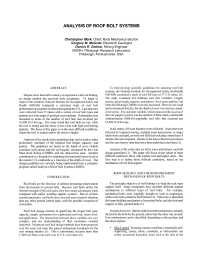Mining Publication: Analysis of Roof Bolt Systems
Original creation date: August 2001
Despite more than half a century of experience with roof bolting, no design method has received wide acceptance. To begin to improve this situation, National Institute for Occupational Safety and Health (NIOSH) conducted a statistical study of roof bolt performance at a number of mines throughout the U.S. Case histories were collected from 37 mines with a variety of roof bolt types and patterns in a wide range of geologic environments. Performance was measured in terms of the number of roof falls that occurred per 10,000 ft of drivage. The study found that roof falls are rare when the roof is strong and the stress is low, even with light roof bolting patterns. The focus of this paper is on the more difficult conditions, where the roof is weaker and/or the stress is higher.
Authors: C Mark, GM Molinda, DR Dolinar
Conference Paper - August 2001
NIOSHTIC2 Number: 20021382
20th Intl Conf on Ground Control in Mining. Morgantown, WV: West Virginia University, 2001 Aug; :218-225
See Also
- Best Practices and Bolting Machine Innovations for Roof Screening
- Design of Primary Roof Support Systems in U.S. Coal Mines Based on the Analysis of Roof Fall Rates
- Elastic and Shear Moduli of Coal Measure Rocks Derived from Basic Well Logs Using Fractal Statistics and Radial Basis Functions
- Factors Influencing Intersection Stability in U.S. Coal Mines
- The Introduction of Roof Bolting to U.S. Underground Coal Mines (1948-1960): A Cautionary Tale
- Optimizing Secondary Roof Support with the NIOSH Support Technology Optimization Program (STOP)
- Preventing Falls of Ground in Coal Mines With Exceptionally Low-Strength Roof: Two Case Studies
- Proceedings: New Technology for Coal Mine Roof Support
- Technology News 483 - Safety Training Tools for Rock Scaling Personnel
- Zen and the Art of Rockbolting
- Page last reviewed: 9/21/2012
- Page last updated: 9/21/2012
- Content source: National Institute for Occupational Safety and Health, Mining Program


 ShareCompartir
ShareCompartir
